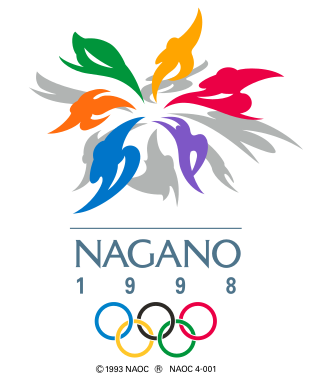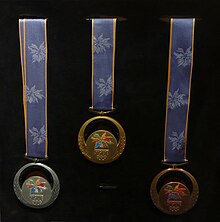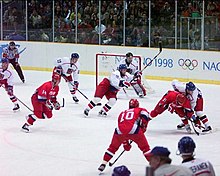
The Winter Olympic Games is a major international multi-sport event held once every four years for sports practiced on snow and ice. The first Winter Olympic Games, the 1924 Winter Olympics, were held in Chamonix, France. The modern Olympic Games were inspired by the ancient Olympic Games, which were held in Olympia, Greece, from 776 BC to 394 AD. The Baron Pierre de Coubertin of France founded the International Olympic Committee (IOC) 1,500 years later in 1894, leading to the first modern Summer Olympic Games in Athens, Greece in 1896. The IOC is the governing body of the Olympic Movement, with the Olympic Charter defining its structure and authority. The original five Winter Olympic Sports were bobsleigh, curling, ice hockey, Nordic skiing, and skating. The Games were held every four years from 1924 to 1936, interrupted in 1940 and 1944 by World War II, and resumed in 1948. Until 1992, the Summer Olympic Games and the Winter Olympic Games were held in the same year. A decision to change this was made in 1986, when during the 91st International Olympic Committee session, IOC members decided to alternate the Summer Olympic Games and the Winter Olympic Games on separate four-year cycles in even-numbered years. Also, at that same congress it was decided that 1992 Winter Olympics would be the last to be held in the same year as the Summer Games and that to change the rotation, the edition that would be held in 1996 would be brought forward by two years, being scheduled to 1994. After this edition, the next one was to be held in 1998 when the 4-year Olympic Cycle resumed.

The 1998 Winter Olympics, officially known as the XVIII Olympic Winter Games and commonly known as Nagano 1998, was a winter multi-sport event held from 7 to 22 February 1998, mainly in Nagano, Nagano Prefecture, Japan, with some events taking place in the nearby mountain communities of Hakuba, Karuizawa, Nozawa Onsen, and Yamanouchi. The city of Nagano had previously been a candidate to host the 1940 Winter Olympics, as well as the 1972 Winter Olympics, but had been eliminated at the national level by Sapporo on both occasions.

The 1972 Summer Olympics, officially known as the Games of the XX Olympiad, took place in Munich, West Germany, from 26 August through 11 September 1972. A total of 7,134 athletes from 121 National Olympic Committees (NOCs) competed in 195 events from 23 sports.
The 1994 Winter Olympics, officially known as the XVII Winter Olympics, were a winter multi-sport event held in Lillehammer, Norway, from February 12 to February 27, 1994. A total of 1,737 athletes representing 67 National Olympic Committees (NOCs) participated in 61 events, from 12 sports and disciplines. These were the only Winter Olympics held two years after the prior Games, as opposed to the four year separation before and after. Continuing the break from tradition of 1992, the medals were primarily made of granite rather than metal; gold, silver, or bronze was used only on the border, the Olympic rings, and a pictogram of the sport for which the medal was awarded.
The 1992 Winter Olympics, officially known as the XVI Olympic Winter Games, were a winter multi-sport event held in Albertville, France, from February 8 to February 23. A total of 1,801 athletes representing 64 National Olympic Committees (NOCs) participated in 57 events from 12 different sports and disciplines. In a break from tradition, the medals were primarily made of crystal rather than metal: gold, silver, or bronze was used only on the border.
The 1988 Winter Olympics, officially known as the XV Olympic Winter Games, was a winter multi-sport event held in Calgary, Canada, from 13 to 28 February 1988. A total of 1,423 athletes representing 57 National Olympic Committees (NOCs) participated in 46 events from 10 different sports and disciplines. Five new events were contested at these Games—men's and women's Super G in alpine skiing, team events in Nordic combined and ski jumping, and women's 5000 metres in speed skating—and two events returned to the program—men's and women's combined in alpine skiing.
The 1984 Winter Olympics, officially known as the XIV Olympic Winter Games, was a winter multi-sport event held in Sarajevo, Yugoslavia, from 8 to 19 February 1984. A total of 1,272 athletes representing 49 National Olympic Committees (NOCs) participated in 39 events from 10 different sports and disciplines. First time NOCs to enter were Egypt, Monaco, Puerto Rico, Senegal, and British Virgin Islands.
The 1980 Winter Olympics, officially known as the XIII Olympic Winter Games, were a winter multi-sport event held in Lake Placid, New York, United States, from February 13 to February 24. A total of 1,072 athletes from 37 nations participated in 38 events from 10 different sports.

The 1976 Winter Olympics, officially known as the XII Olympic Winter Games, was a winter multi-sport event held in Innsbruck, Austria, from 4 to 15 February 1976. A total of 1,123 athletes representing 37 National Olympic Committees (NOC) participated in 37 events from 10 different sports and disciplines. Two events were contested for the first time: the figure skating discipline of ice dancing, and the men's 1,000 metres in speed skating.

The 1924 Winter Olympics, officially known as the I Olympic Winter Games, and known at the time as Semaine Internationale des Sports d'Hiver, was a winter multi-sport event held in Chamonix, France, from 25 January to 5 February 1924. Norway topped the table, collecting seventeen medals in total, including four gold, three of which were won by Thorleif Haug in the Nordic combined and cross-country skiing events. Norway also achieved two podium sweeps, winning all three medals in both the 50 km cross-country skiing and the Nordic combined. This remained a record at the Winter Olympics until 2014.
The 1972 Winter Olympics, officially known as the XI Olympic Winter Games, was a winter multi-sport event held in Sapporo, Japan, from 3 to 13 February 1972. A total of 1,006 athletes representing 35 National Olympic Committees (NOCs) participated in 35 events from 10 different sports and disciplines.
The 1968 Winter Olympics, officially known as the X Olympic Winter Games, was a winter multi-sport event held in Grenoble, France, from 6 to 18 February 1968. A total of 1,158 athletes representing 37 National Olympic Committees (NOCs)—including Morocco's first delegation—participated in 35 events from 10 different sports and disciplines. The team relay (4 × 7.5 km) event in biathlon was contested for the first time.
The 1952 Winter Olympics, officially known as the VI Olympic Winter Games, took place in Oslo, Norway, from 14 to 25 February 1952. A total of 694 athletes representing 30 National Olympic Committees (NOCs) participated in the Games, taking part in 22 events from 6 sports.

The 2006 Winter Olympics, officially known as the XX Olympic Winter Games, was a winter multi-sport event held in Turin, Italy, from February 10 to February 26, 2006. A total of 2,508 athletes representing 80 National Olympic Committees (NOCs) participated in 84 events from 15 different sports and disciplines.

Canada has competed at every Winter Olympic Games, and has won at least one medal each time. By total medals, the country's best performance was in the 2018 Winter Olympic Games where Canadian athletes won 29 medals. Canada set a new record for most gold medals won by a country in a single Winter Olympics with 14 at the 2010 Winter Olympics in Vancouver, Canada. This achievement surpassed the previous record of 13 gold medals held by the Soviet Union (1976) and Norway (2002). Both Germany and Norway matched the record total of 14 gold medals in Pyeongchang in 2018. This record has since been surpassed by Norway with 16 at the 2022 Winter Olympics.

Snowboarding is a sport at the Winter Olympic Games. It was first included in the 1998 Winter Olympics in Nagano, Japan. Snowboarding was one of five new sports or disciplines added to the Winter Olympic program between 1992 and 2002, and was the only one not to have been a previous medal or demonstration event. In 1998, four events, two for men and two for women, were held in two specialities: the giant slalom, a downhill event similar to giant slalom skiing; and the half-pipe, in which competitors perform tricks while going from one side of a semi-circular ditch to the other. Canadian Ross Rebagliati won the men's giant slalom and became the first athlete to win a gold medal in snowboarding. Rebagliati was briefly stripped of his medal by the International Olympic Committee (IOC) after testing positive for marijuana. However, the IOC's decision was reverted following an appeal from the Canadian Olympic Association. For the 2002 Winter Olympics, giant slalom was expanded to add head-to-head racing and was renamed parallel giant slalom. In 2006, a third event, the snowboard cross, was held for the first time. In this event, competitors race against each other down a course with jumps, beams and other obstacles. On July 11, 2011, the International Olympic Committee's Executive Board approved the addition of Ski and Snowboard Slopestyle to the Winter Olympics roster of events, effective in 2014. The decision was announced via press conference from the IOC's meeting in Durban, South Africa. A fifth event, parallel slalom, was added only for 2014. Big air was added for 2018.

Ross Rebagliati is a Canadian snowboarder who won a gold medal in the men's giant slalom event at the 1998 Winter Olympics. The International Olympic Committee initially stripped him of the medal due to a failed drug test for cannabis use, but was overruled by an appeals court two days later, resulting in the medal being restored. Since retiring from snowboarding, Rebagliati has become an entrepreneur in the cannabis industry.












